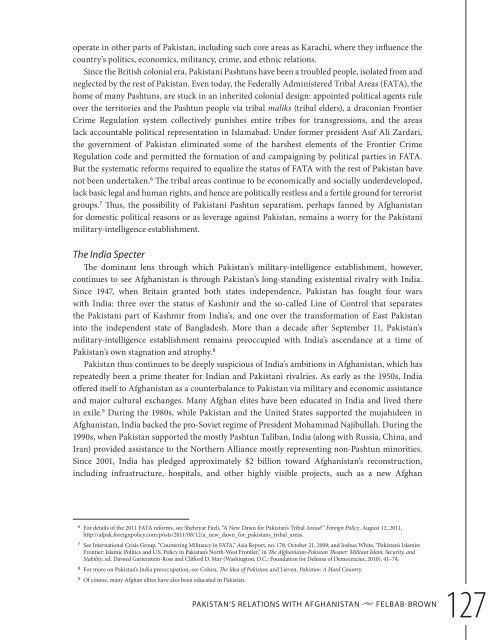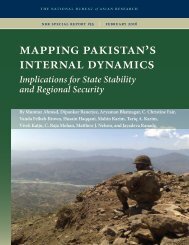pakistan’s
SR55_Mapping_Pakistan_February2016
SR55_Mapping_Pakistan_February2016
Create successful ePaper yourself
Turn your PDF publications into a flip-book with our unique Google optimized e-Paper software.
operate in other parts of Pakistan, including such core areas as Karachi, where they influence the<br />
country’s politics, economics, militancy, crime, and ethnic relations.<br />
Since the British colonial era, Pakistani Pashtuns have been a troubled people, isolated from and<br />
neglected by the rest of Pakistan. Even today, the Federally Administered Tribal Areas (FATA), the<br />
home of many Pashtuns, are stuck in an inherited colonial design: appointed political agents rule<br />
over the territories and the Pashtun people via tribal maliks (tribal elders), a draconian Frontier<br />
Crime Regulation system collectively punishes entire tribes for transgressions, and the areas<br />
lack accountable political representation in Islamabad. Under former president Asif Ali Zardari,<br />
the government of Pakistan eliminated some of the harshest elements of the Frontier Crime<br />
Regulation code and permitted the formation of and campaigning by political parties in FATA.<br />
But the systematic reforms required to equalize the status of FATA with the rest of Pakistan have<br />
not been undertaken. 6 The tribal areas continue to be economically and socially underdeveloped,<br />
lack basic legal and human rights, and hence are politically restless and a fertile ground for terrorist<br />
groups. 7 Thus, the possibility of Pakistani Pashtun separatism, perhaps fanned by Afghanistan<br />
for domestic political reasons or as leverage against Pakistan, remains a worry for the Pakistani<br />
military-intelligence establishment.<br />
The India Specter<br />
The dominant lens through which Pakistan’s military-intelligence establishment, however,<br />
continues to see Afghanistan is through Pakistan’s long-standing existential rivalry with India.<br />
Since 1947, when Britain granted both states independence, Pakistan has fought four wars<br />
with India: three over the status of Kashmir and the so-called Line of Control that separates<br />
the Pakistani part of Kashmir from India’s, and one over the transformation of East Pakistan<br />
into the independent state of Bangladesh. More than a decade ater September 11, Pakistan’s<br />
military-intelligence establishment remains preoccupied with India’s ascendance at a time of<br />
Pakistan’s own stagnation and atrophy. 8<br />
Pakistan thus continues to be deeply suspicious of India’s ambitions in Afghanistan, which has<br />
repeatedly been a prime theater for Indian and Pakistani rivalries. As early as the 1950s, India<br />
offered itself to Afghanistan as a counterbalance to Pakistan via military and economic assistance<br />
and major cultural exchanges. Many Afghan elites have been educated in India and lived there<br />
in exile. 9 During the 1980s, while Pakistan and the United States supported the mujahideen in<br />
Afghanistan, India backed the pro-Soviet regime of President Mohammad Najibullah. During the<br />
1990s, when Pakistan supported the mostly Pashtun Taliban, India (along with Russia, China, and<br />
Iran) provided assistance to the Northern Alliance mostly representing non-Pashtun minorities.<br />
Since 2001, India has pledged approximately $2 billion toward Afghanistan’s reconstruction,<br />
including infrastructure, hospitals, and other highly visible projects, such as a new Afghan<br />
6 For details of the 2011 FATA reforms, see Shehryar Fazli, “A New Dawn for Pakistan’s Tribal Areas?” Foreign Policy, August 12, 2011,<br />
http://afpak.foreignpolicy.com/posts/2011/08/12/a_new_dawn_for_pakistans_tribal_areas.<br />
7 See International Crisis Group, “Countering Militancy in FATA,” Asia Report, no. 178, October 21, 2009; and Joshua White, “Pakistan’s Islamist<br />
Frontier: Islamic Politics and U.S. Policy in Pakistan’s North-West Frontier,” in The Afghanistan-Pakistan Theater: Militant Islam, Security, and<br />
Stability, ed. Daveed Gartenstein-Ross and Clifford D. May (Washington, D.C.: Foundation for Defense of Democracies, 2010), 41–74.<br />
8 For more on Pakistan’s India preoccupation, see Cohen, The Idea of Pakistan; and Lieven, Pakistan: A Hard Country.<br />
9 Of course, many Afghan elites have also been educated in Pakistan.<br />
PAKISTAN’S RELATIONS WITH AFGHANISTAN u FELBAB-BROWN<br />
127



